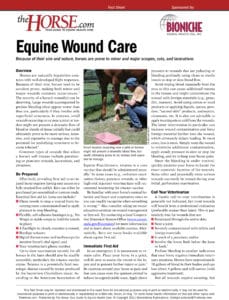Bone Marrow-Derived Stem Cells Aid Bone Healing
Bone marrow-derived mesenchymal stem cells (BMDMSCs) can be genetically modified in culture and subsequently used in live horses to enhance healing of bone defects, according to Colorado State University (CSU) researchers.
“BMDMSCs are ‘flexible’ cells that have the capacity to become one of a variety of connective tissue cell types, including bone cells (osteoblasts)













